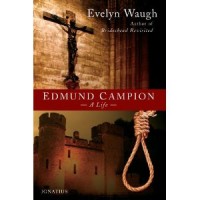The Hook of Truth, by Gerard Kreijen
A review of Edmund Campion: A Life by Evelyn Waugh (Ignatius Press, 2005 [First published by Longmans, 1935])
That the undisputed master of dark humor and satire should have produced what is arguably the most compelling short biography of a saint to date is perhaps even more extraordinary than the claim that, today, both the biography and its author deserve close attention. Indeed, few means serve better to confront the hollow relativism of our age than turning to the conversion of Evelyn Waugh (1903-1966) and the life of Edmund Campion (1540-1581), the saintly subject of his 1935 book.
When Waugh was received into the Roman Catholic Church on September 29, 1930 his latest book had just been dubbed “the ultramodern novel”, so that his conversion caused sensation and bewilderment. In an article entitled, “Converted to Rome: Why It Has Happened to Me”, Waugh made it perfectly clear that his decision was not about ritual nor about submission to the view of others. The essential issue was the choice between Christianity and chaos.
Waugh had come to see Modernity as “the active negation of all that Western culture has stood for”. Civilization, he understood, “has not in itself the power of survival”. Christianity was the foundation of the West and without it the moral and aesthetic fabric of Europe would unravel. For Waugh this was a fact and the acknowledgment of this fact set him against modern society; it was his casus belli:
“The loss of faith in Christianity and the consequential lack of confidence in moral and social standards have become embodied in the ideal of a materialistic, mechanized state […] It is no longer possible […] to accept the benefits of civilization and at the same time deny the supernatural basis upon which it rests. “[1]
Thus Waugh turned “from ultramodern to ultramontane, and in doing so passed from fashion to anti-fashion”.[2] He became, as George Orwell quipped, “about as good a novelist as one can be while holding untenable opinions”.[3] In his literary attempts to represent man more fully, which for Waugh meant “only one thing, man in his relation to God”[4], he focused on the theme of the redemption of lost souls – notably, in his celebrated novel Brideshead Revisited (1945). Redemption, Waugh later explained with a reference to G.K. Chesterton, may be compared “to the fisherman’s line, which allows the fish the illusion of free play in the water and yet has him by the hook; in his own time the fisherman by a ‘twitch upon the thread’ draws the fish to land”.[5]
One gathers why Waugh wrote a life of Edmund Campion, the respected Oxford scholar who fled Elizabethan England amidst the troubles of the Reformation and who returned as a Jesuit priest to “crie alarme spiritual against the foul vice and proud ignorance, wherewith many my dear countrymen are abused”, finally to meet a martyr’s death at Tyburn.
Read complete article in The Clarion Review
